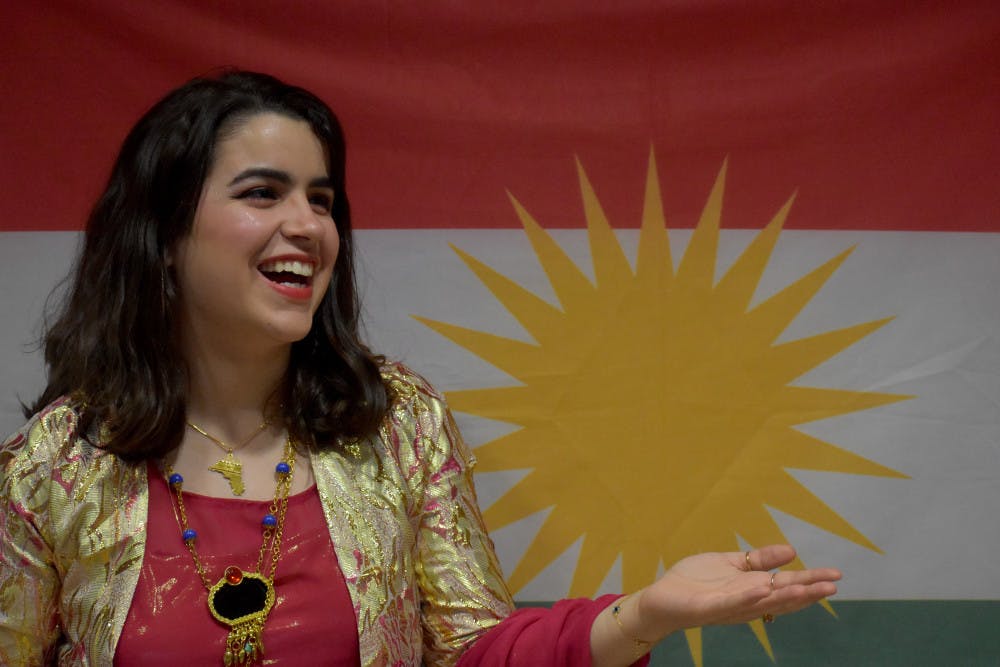When Sara Zandy closes her eyes, she sees springtime where mountains are covered in flowers. Pomegranates are the size of a hand. Waterfalls outline the landscape. Villagers make bread and drink tea.
To Zandy, that’s Kurdistan, a region encompassing portions of Turkey, Syria, Iraq and Iran.
Zandy, Kurdish Student Association president, is one of 15,000 Kurds living in the U.S. and one of three identified undergraduate Kurdish students at UF. Her childhood memories of visiting Iraqi Kurdistan are filled with images of relaxing areas where the best thing to do is picnic.
But, that’s not the reality for the rest of the region.
Turkish military forces invaded Kurdish-controlled northern Syria on Oct. 9 following President Donald Trump’s withdrawal of American forces from the region. The decision was widely criticized by Kurdish forces, with a leader calling it “akin to genocide,” according to the Associated Press.
As of last Friday, a senior U.S. coalition commander told the AP the partnership between the U.S. and Syrian Kurdish forces fighting the Islamic State group remain strong, despite the invasion.
However, Zandy, a 20-year-old UF biological and cognitive neuroscience junior, said she considers what’s happening in Syria as legally sanctioned ethnic cleansing and an attempt to wipe out her people.
“It’s like if you live in Florida and another American lives in Washington,” she said. “You’re both American.”
Zandy’s parents left Iraq as Kurdish political refugees in 1996 after persecution under Saddam Hussein. It was a life or death situation. They chose a new life for their family in America.
She fears the potential for genocide could affect as many as 2 million Syrian Kurds. According to the BBC, Kurds are the largest ethnic minority in Syria, making up between 10 to 15 percent of the country’s total population of 22 million. That means the loss of their identity because the Kurdish language and culture has evolved differently in Syria, leaving the culture with no concrete history or books.
But as the president of the Kurdish Student Association, she doesn’t need books to share her culture.
Zandy has not always been in touch with her roots. When she was younger, she was embarrassed by her culture, yearning to just be a regular American girl.
That all changed her freshman year of high school when her family drove to Virginia to attend a Newroz celebration, the Kurdish new year. She was surprised to see kids her age dressing in traditional gowns and speaking in Kurdish.
“Something in that moment made me proud of being Kurdish,” she said.
When she first came to UF, she struggled finding friends, involvement and passion. But, she eventually found her place in the Kurdish community. Although it was just her and one other person. They met another Kurdish student and their club grew.
“Seeing the familiarity on campus was such a great moment for me,” Zandy said. “I love seeing people get connected from around the world.”
While Zandy has been trying to promote the culture in Gainesville, she said it’s being erased in Turkey.
Matthew Jacobs, a specialist in the Middle East at UF, said the Turkish government has been trying to minimize the Kurdish influence in the region for years. Kurds in Iraq have significant political autonomy, and Turkish President Recep Tayyip Erdogan is concerned the spread of Kurdish autonomy in Syria could lead to calls for autonomy within Turkey as well.
The Turkish invasion caused the Kurds to lose land within Syria, he said. At the same time, Erdogan is attempting to use the military strike to regain political support within his own borders, where he has faced criticism during his presidency.
The Turkish government’s next move is to claim parts of northern Syria as its border, he said. Shortly after the Turkish invasion, the U.S. government negotiated a cease-fire between Turkey and the Kurds. However, clashes between Turkish and Kurdish forces continue.
Syrian Kurds’ retreat from the area could be problematic for Americans. The New York Times reported that loss of Kurdish power may allow up to 11,000 captured Islamic State fighters and their families to escape detention camps guarded by the Kurds.
Syrian Kurds have three options, Jacobs said. They could build stronger ties with the autonomous Iraqi Kurds, collaborate with the violent Kurdistan Workers’ Party in Turkey or try surviving day-to-day life within reduced territory in Syria.
As a Kurdish American, Zandy believes she has a duty to educate people in the U.S. on the history and culture of the Kurdish people as well as current events within Kurdistan. She said misinformation creates conspiracies about Kurds, which is harmful as they already face a lot of discrimination in the Middle East.
The Kurdish Student Association hosted a panel on Oct. 25 to discuss the events in northern Syria. About 40 people attended the event, with two professors discussing the situation and opened the floor to answer community questions. There will be more events showcasing and educating the public on Kurdish culture in the future, she said.
“I feel I’m doing my job as a Kurdish woman,” Zandy said.
Sara Zandy, 20, representing her culture wearing a jily kurdy in front of the Kurdish flag.






